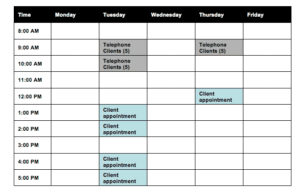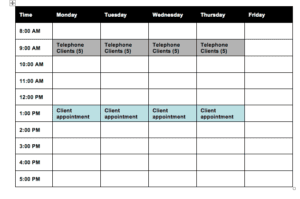[Transcription]
Back by popular demand, it’s time for the 21-day Time Mastery Challenge.
This is day 13.
We’re going to continue to focus on client care. To start, I want to review this we’ve been covering over the last few days because it’s vitally important, not just for getting greater control over your time, but also for taking care of your clients, particularly your ultimate clients.
At this point, you’ve pared the number of clients that you work with back because you fired at least one client, hopefully more. You defined your ultimate client, the type of people that you really want to build your business around. And when it comes to time mastery, one cool thing, your ultimate clients really don’t take more time than anybody else.
In fact, your ultimate clients take less time because they get you the best.
A few days ago, when you defined your ultimate client relationship, I also had you count the number of ultimate clients that you work with and I had you state what is your client service commitment to those ultimate clients.
Then two days ago, I said, how many other clients do you currently serve, those middle tier clients, those family and friends, those folks that you should be getting rid of but haven’t done it yet ?And what is your commitment to them in terms of time?
And yesterday, I asked, based on your understanding of clients are, what different segments you have them in, and what your client care commitments are…
Wat’s your client care formula?
How do you measure the number of communications from in-person meetings to webinars to events to phone calls to personal emails? How do you break that down in terms of activities? We looked at a couple different models. I’ll just go back and mention one because it’s a great baseline for thinking about a client care formula. I call it 6-2-1…where you commit to speaking with your clients at least 6 times a year so no more than 60 days goes by where a client won’t hear from you. Of those 6 communications, 2 are reviews and 1 of those reviews is done in-person. That’s just one way to come up with the formula. Hopefully you have your own formula so we can apply that today as we start building your ideal day.
A big part of this time mastery program is to commit to an ideal day.
I’m going to make sure that you have an ideal day knocked out. You should have a real commitment to an ideal day each and every day that encompasses everything that you need to do to be able to run the business of your dreams and have control over your time. As you’re doing that, as I’ve said a couple of times, probably more than a couple of times during the last few recordings…
Clients must come first.
If you don’t put your clients first, they’ll have a way off falling by the wayside. They won’t get the kind of service that they deserve…even when you THINK they are.
Another important aspect of creating your ideal day is that it requires discipline.
You can’t just randomly think “these are the things that I need to get done” because you like flexibility in your schedule. You don’t like being pinned down. You enjoy what you consider to be freedom. You don’t put your priorities into blocks of time. That’s a mistake because that actually traps you, it limits your freedom.
Aristotle said, “Through discipline comes freedom.”
When you know what you need to do, when you need to do it, it’s easier to find time for all of the other things that you really want to get done…whether it’s for work or for fun. That’s where you get real freedom. It’s critical to be thinking that way.
So, today, what I want to talk about time blocking as it relates to your client care formula.
It’s one thing to have that formula, to know how many times you’re going to be interacting with your clients on an annual basis. And it’s another thing to break it down and think about how that really applies to the work that you do day to day.
What if your formula doesn’t fit?
What if you say that you’re going to make more connections or contacts with your clients than there are hours in your working week? Or that because of the number of weeks you work each year you don’t have enough time to get it done. It’s good to know that upfront as you’re putting client care first, as you’re blocking out your schedule.
The reason time blocking is so important…you are working on a single activity repeatedly during the same block of time. You get more done. You’re NOT multitasking. You’re not allowing yourself to be distracted.
So, what I want you to do today…take your client care formula and apply it to a blank calendar. I want you to be think about your commitments to a certain number of client meetings or a certain number of client calls, are they going to fit into your calendar?
Let me show you an example of what I’m talking about.
This is just a very basic calendar showing Monday through Friday from 8 a.m. to 5 p.m. One thing that you might be doing as you’re thinking about applying your client care formula to your time blocking is…where are those phone calls going to fit in? Are you going to make 5 phone calls to clients from 9 a.m. to 10 a.m. 4 days a week? 5 days a week? Are there different hours that you’re going to do that?
If you’re going to be meeting with clients in-person to do those reviews, are you going to be doing one review a day, 4 days a week? You have to plug it in and think about how that works, think about how the math works relating your client care formula…to the number of clients that you work with…and then literally apply it to your calendar.
Some advisors like having each day look the same.
If that’s the way that you think about your schedule then, as you start building your client care formula into the time blocking on your calendar, it might look something like this (above).
Others of you don’t like doing the same things every day.
 Maybe you say, I don’t really want to talk to anybody on Mondays. Mondays are to get my week in order, work on my projects…whatever the case might be. You say Tuesday is going to be a client day so that’s where you plug in the number of phone calls that you need to make to really keep up with your client care formula. It’s where you plug in your client appointments. And then maybe Thursday is kind of a bleed over day for people who can’t make it on Tuesday, you have any extra day. I’m not saying that Tuesday is the best day. I’m not saying that doing everything the same way each day of the week is the right way to do it.
Maybe you say, I don’t really want to talk to anybody on Mondays. Mondays are to get my week in order, work on my projects…whatever the case might be. You say Tuesday is going to be a client day so that’s where you plug in the number of phone calls that you need to make to really keep up with your client care formula. It’s where you plug in your client appointments. And then maybe Thursday is kind of a bleed over day for people who can’t make it on Tuesday, you have any extra day. I’m not saying that Tuesday is the best day. I’m not saying that doing everything the same way each day of the week is the right way to do it.
I used as an example yesterday…there are clients of mine who dedicate the first week of the month to their clients (and that may even bleed over into the second week). Then they have the other weeks to work on other parts of their business, whether it’s prospecting and client acquisition or different business development efforts. But think about this, how does your client care formula help you block off your time?
Does it fit? Is there enough time?
So…print out a blank calendar or use your current calendaring system and start plugging in how you might lay out your week as it relates to time blocking for your clients.
Build your client commitments into your calendar.
Use your client care formula relative to the number of clients that you’re working with and make sure that you can start building that ideal week by first deciding how you’re going to build your client commitments into your calendar. We’ll pick it up from there tomorrow.
Thanks again for listening. Have a great day. See you soon. Bye.

